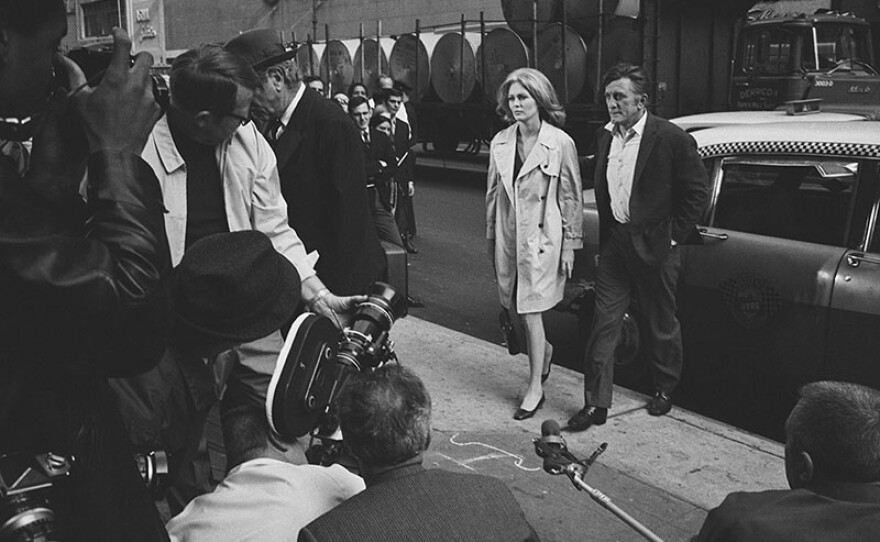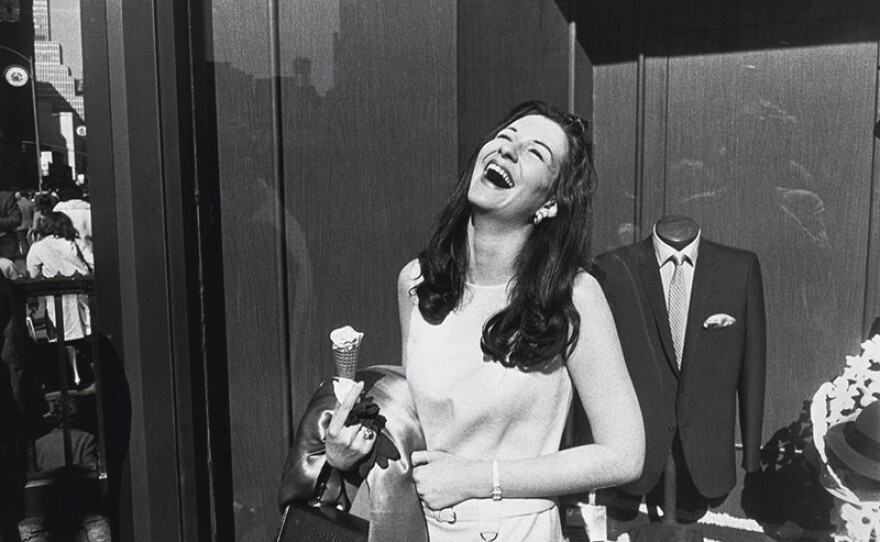—AMERICAN MASTERS Presents the First Documentary on the Celebrated Photographer—
Decades before digital technology transformed how we make and see pictures, Garry Winogrand made over 1 million of them with his 35mm Leica camera, creating an encyclopedic portrait of America from the late 1950s to the early 1980s in the process.
When he died suddenly at age 56, Winogrand left behind more than 10,000 rolls of film – more than a quarter of a million pictures.
These images capture a bygone era: the New York of Mad Men, the early years of the Women’s Movement, the birth of American suburbs and the glamour and alienation of Hollywood.
He produced so many unseen images that it has taken until now for the full measure of his artistic legacy to emerge.
AMERICAN MASTERS “Garry Winogrand: All Things Are Photographable” is the first cinematic survey of that legacy.
Related: 10 Iconic Photos by Street Photography Pioneer Garry Winogrand
With unprecedented access to Winogrand’s estate and the cooperation of his gallery, the film tells the story of an artist whose rise and fall was – like America’s in the late decades of the 20th century – larger-than-life, full of contradictions and totally unresolved.
In addition to hundreds of iconic photographs, filmmaker Sasha Waters Freyer makes ample use of Winogrand’s previously unseen 8mm color home movies of his parents, three wives and children, plus the wealth of footage created as he roamed city streets and attended 1960s protests.
The film also features newly discovered audio cassette tapes of Winogrand, which are the only un-staged media of the artist in existence. These cassette tapes capture conversations with an old friend, recorded in a forgotten Texas diner, about ex-wives, parents, children, sex, students, and the meaning and making of art.
Following his first solo exhibition at the Museum of Modern Art in New York in 1969, Winogrand’s work has since been exhibited at museums and galleries across the country and around the world.
Through his own words and images, “Garry Winogrand: All Things Are Photographable” presents an intimate portrait of a man who both personified his era and transformed it.

Notable Interviewees:
- Matthew Weiner, writer, creator of MAD MEN
- Geoff Dyer, author, “The Street Philosophy of Garry Winogrand”
- Jeffrey Fraenkel, Fraenkel Gallery, San Francisco
- Leo Rubinfien, photographer and writer; guest curator of the 2013 retrospective, "Garry Winogrand," organized by the San Francisco Museum of Modern Art (SFMOMA) and the National Gallery of Art (Washington, D.C.), which toured internationally.
- Susan Kismaric, photography curator, Museum of Modern Art, 1980-2011
- Adrienne Lubeau, Winogrand’s wife (1952-1966)
- Tod Papageorge, photographer
- Erin O’Toole, Associate Curator of Photography, SFMOMA
- Laurie Simmons, photographer and filmmaker
Buzzworthy Moments:
- The film features newly-discovered audio cassette tapes of Garry Winogrand and previously unseen 8mm footage shot by the photographer.
- The film features music by U2, R.E.M., Luna, Bob Dylan, Steve Winwood and Bob Seger, plus original jazz compositions by Garry Winogrand’s son, Ethan Winogrand.
- The film spotlights Garry Winogrand’s under-examined later work and the controversies he faced, such as the backlash against his 1975 book "Women Are Beautiful." Released at the height of second-wave feminism, the book was criticized for its male gaze and objectification of women.

Garry Winogrand’s influence and achievements:
- Winogrand’s “snapshot aesthetic,” once derided by critics, is now the universal language of contemporary image making.
- Winogrand was among the generation of photographers that turned street photography into high art.
- Winogrand received three John Simon Guggenheim Memorial Foundation Fellowships.
- Winogrand’s most well-known photographs include shots of Marilyn Monroe, her skirt blown askew on the set of "The Seven Year Itch"; Norman Mailer’s 50th birthday party; and tourists at Dealey Plaza in Dallas following the Kennedy assassination.
- Winogrand captured rowdy Texas rodeos, political conventions, angry protests, zoos, parades, celebrity balls and city streets teeming with women newly liberated from the repressive 1950s. His camera seized upon the spectacle of a massive social upheaval—that age when American mania for self-promotion and wanton exhibitionism was in its infancy.
- With his "Public Relations" project, Winogrand is considered to be among the first to show that the event was of secondary importance to the photograph of the event. Public Relations is considered to be at the cusp of post-modernism; with the project he fulfilled the notion that the event existed in order to be photographed.
Garry Winogrand’s career and archive:
- Winogrand died on March 19, 1984, at age 56. 2019 marks the 35th anniversary of his death.
- In 1961, Edward Steichen, Director of the Department of Photography at MoMA, bought three prints from Winogrand for $10.00 each. His successor, John Szarkowski, once believed Winogrand to be the most prolific, innovative photographer of his time.
- In 1967, Winogrand’s work was included in the landmark three-person show "New Documents" at MoMA alongside fellow photographers Lee Friedlander and Diane Arbus.
- Winogrand’s career took a turn in the early 1980s. Adrift from his New York roots, his work was at odds with feminists and art critics – even his one-time champion, MoMA’s John Szarkowski, called him a “has-been.” A new, conceptual art photography – epitomized by artists such as Cindy Sherman and Barbara Krueger – was displacing the straightforward vernacular of Winogrand and his ilk.
- After Winogrand’s death in 1984, MoMA’s Director of the Department of Photography John Szarkowski commissioned the processing and printing of approximately 2,500 rolls of his undeveloped film and 4,100 of developed but unproofed rolls, which were subsequently edited by Szarkowski, Tod Papageorge and Thomas Roma. In 1988, Szarkowski mounted a Winogrand retrospective at MoMA, including previously unseen, posthumous works. Szarkowski considered many of the later, posthumous photographs to be inferior; the influence of his status and opinion led to a dismissal of Winogrand’s later work.
- In recent years, much more of Winogrand’s vast photo archive has been printed and exhibited, urging a reassessment of the photographer’s late-career work. In 2013, SFMOMA and the National Gallery of Art co-presented the first major American retrospective of Winogrand’s work since 1988. Guest curator Leo Rubinfien looked through hundreds of thousands of frames; one-third of the photographs showcased in the retrospective were never published or exhibited by Winogrand – nearly 100 were printed and shown publicly for the first time.
The film received SXSW Special Jury Recognition in the Documentary Feature Competition for Best Feminist Reconsideration of a Male Artist after its world premiere at the festival.
WATCH ON YOUR SCHEDULE:
This film will be available to stream on demand for a limited time beginning April 19, 2019, simultaneously with the broadcast. Extend your viewing window with KPBS Passport, video streaming for members ($60 yearly) using your computer, smartphone, tablet, Roku, AppleTV, Amazon Fire or Chromecast. Learn how to activate your benefit now.
SUBSCRIBE TO THE AMERICAN MASTERS PODCAST:
Listen to new interviews with contemporary artists, along with previously unreleased interviews from the series' award-winning documentary films. Subscribe now
JOIN THE DISCUSSION:
AMERICAN MASTERS is on Facebook, Instagram, tumblr, and you can follow @PBSAmerMasters on Twitter. #AmericanMastersPBS
CREDITS:
Produced, directed and edited by Sasha Waters Freyer. Executive Producers are David Koh, Alice Koh, and Dan Braun. Eddie Marritz is the Director of Photography. Original music is by Ethan Winogrand. Animation is by Kelly Gallagher. Michael Kantor is AMERICAN MASTERS series executive producer.






